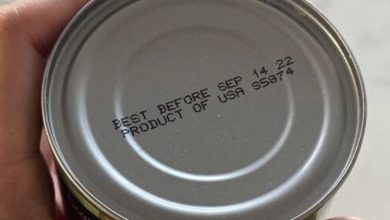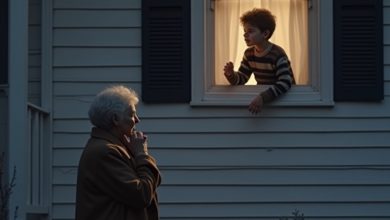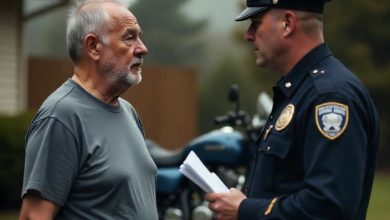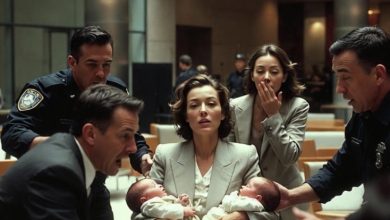“From Soccer Field to Suspicion: How a Back-Door Hospital Visit and a Brave Nurse Safeguarded Ethan from a Hidden Plot”
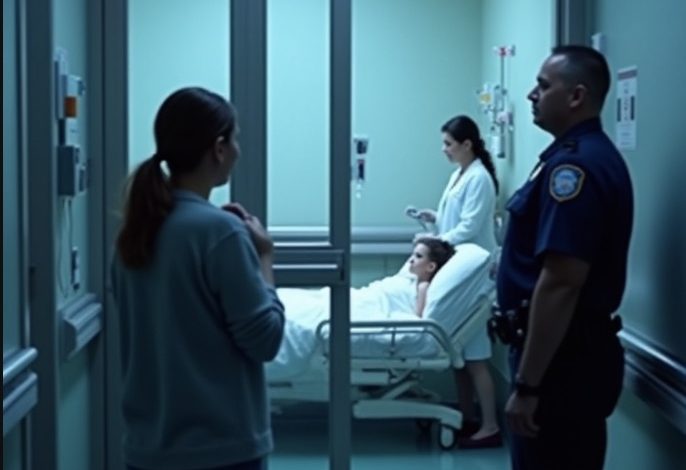
At midnight my phone buzzed on the nightstand. I jerked awake, heart racing. On the screen: Boston General Hospital. I swiped.
“Mrs. Bennett?” The voice was Mary, my son’s nurse—usually calm, usually warm. Now she sounded breathless and afraid. “Please come to the hospital right now. Come alone. And… please don’t call your husband.”
“What? Mary, what’s going on? Is Ethan alright?”
“He’s stable at the moment,” she whispered. “But you need to hurry. Use the back entrance. I’ll meet you there.”
The line went dead. I stared at the dark ceiling, the room spinning in silence, a single thought pounding in my head: Why not Michael?
I threw on jeans and a sweatshirt, grabbed my keys, and drove through sleeping streets. Every light turned green, as if the city itself wanted me at the hospital as quickly as possible.
Mary was waiting in the shadow of a loading dock, face pale under the security lamp. She pulled me inside with a finger to her lips. “Quiet,” she mouthed.
The elevator opened on the third floor. That’s when I saw them—police officers, four at least, some in uniform, some in plain clothes, stationed along the pediatric hallway. The sight rooted me to the floor.
An older man with gray at his temples stepped forward, voice lowered. “Mrs. Bennett? I’m Detective Wilson with Boston Police. Your son is safe. What you’re about to see may shock you. Whatever happens, please don’t shout.”
He guided me to the little window in Ethan’s door.
Inside, my boy slept, face turned toward the rail, lashes resting on his cheeks. Beside him stood a woman in a white lab coat, back to the door, a syringe pinched between two gloved fingers as she reached for the IV port.
She shifted just enough for me to see her profile, and the world narrowed to a pinpoint. Dr. Monica Chen. The elegant “old friend from college” Michael had introduced at a company event three months earlier.
Before I could make a sound, Detective Wilson lifted his hand. The officers moved as one. The door swung open. “Police! Hands where we can see them!”
The syringe slipped from Monica’s hand and burst on the tile, clear fluid beading across the floor. She lifted her hands, eyes dull with a kind of heavy acceptance, and said nothing as an officer cuffed her wrists.
I lunged for Ethan, but Mary blocked me gently. “He’s okay,” she whispered, voice shaking. “She didn’t get anything into the line. I caught her in time and called the police.”
An officer bagged the IV and swabbed up the liquid. Monica was led past me. Our eyes met—mine full of terror, hers bleak and wet with tears.
“Why?” I said, but she lowered her gaze and kept walking.
A family that looked perfect
Two weeks earlier, no one would have believed any of this could happen to us.
We lived just outside Boston, on a tree-lined street where the maples flared red in October. That morning had been everything ordinary and good—pancakes sizzling, Ethan in his blue soccer jersey tugging at my sleeve. “Mom, do you think Dad can make the game today?”
“Your dad promised he’d come after his meeting,” I told him, stacking steaming pancakes on his plate.
Michael had recently been promoted to sales director for a medical-equipment company. New title, bigger paycheck, constant travel. He kissed my temple on the way out the door, murmuring, “I’ll see you at the field.”
Ethan scored the first goal. My parents cheered beside me. Michael jogged up near the end, out of breath but smiling.
“I made it,” he grinned, dropping onto the bleacher. “How’s my champ?”
“He nailed it,” I said, leaning into him. That night on the sofa, he suggested we take a Europe trip next summer—London, Paris, Rome. Ethan’s eyes lit up. My chest warmed. It all felt safe. It all felt right.
But a small shadow had already started to stretch across our days.
Ethan began complaining of brief, dizzy spells—no fever, no cough, just sudden lightheadedness. Once, twice, then three times. I pushed water and rest; the worry stayed.
“We should get him checked,” I told Michael. He agreed quickly. “I know a good team at Boston General,” he said. “There’s a brilliant pediatrician—Dr. Johnson.”
At the hospital, Dr. Johnson recommended a two-night stay and a full workup: EEG, MRI, blood panel. “Just to be thorough,” he said kindly. Mary, the nurse assigned to us, had warm eyes and a steady way of talking that eased my son’s nerves. The pediatric unit walls were painted with cheerful animals; autumn blazed in the park outside Ethan’s window.
The first day was simple. Stickers and wires for the EEG, a quick blood draw, then time in the playroom where Ethan met a boy named Jason. Michael showed up after work in his suit, sat at the bed’s edge, and joked until Ethan laughed. “I’ll be here early tomorrow,” he promised.
Day two, he called with a sigh. “Kate, I’m so sorry—last-minute trip to New York. Huge account. I’ll be back by afternoon for the results.”
I swallowed my disappointment. “Do what you have to do,” I said, then explained to Ethan. He frowned, then shrugged in that brave way kids do. “Dad’s busy. It’s okay.”
The morning of day three, the final blood draw finished. Mary smiled, told Ethan he’d likely go home if the results looked good. For a heartbeat her expression clouded, then smoothed. I told myself I imagined it.
By midafternoon, Dr. Johnson said we’d have answers that evening. He urged me to go home for a few hours. “We’ll call if there’s anything urgent,” he said kindly.
I waited for Michael to call from New York. He didn’t. By 11 p.m., unease sat heavy in my chest. Sometime after midnight, I fell asleep on the couch with the phone in my hand. At 2:15 a.m., it rang. Come alone. Don’t call your husband.
The truth behind the window
After Monica’s arrest, Ethan was moved to observation. I sat with him until the sun reached the windows and turned the room a pale white. An officer drove me to the station.
Detective Wilson opened a file and spoke gently. “Mrs. Bennett, I’m going to tell you everything we’ve learned. It will be hard to hear.”
I folded my hands to stop their shaking. “Okay.”
“Dr. Monica Chen has been in a relationship with your husband Michael Bennett for three years,” he said.
The words landed like a blow. Three years. So many late meetings. So many business trips. The Europe conversation on our sofa cracked and went dark in my memory.
He slid photos across the table—restaurant tables, hotel lobbies, small touches and smiles that left no room for doubt. The room tilted. I forced myself to keep looking.
Mary came in and sat beside me. Her voice was steady but soft. “I noticed an order in Ethan’s chart I knew was wrong. His record clearly states a severe penicillin allergy from when he was a baby. The charted order was for a high dose of a penicillin-based antibiotic.”
Detective Wilson tapped a copy of the chart. “If that had been infused, he would have gone into anaphylactic shock within minutes.”
“He could have died,” Mary finished, eyes glistening. “I reported it to the hospital director. He told me not to ‘create problems.’ I went to the police.”
The detective laid out more documents—messages between Michael and Monica. Michael: Ethan’s allergic to penicillin. Never use it.
Monica, days later: This time, we will. We can make it look like a hospital error.
Michael’s reply: I understand. I trust you.
The nausea came in a wave. “He planned this,” I whispered.
“The so-called New York trip was part of an alibi,” Wilson said. “He was at Monica’s apartment tonight.”
I asked to call him. The detective nodded and put my phone on speaker.
“Hey, Kate,” Michael answered, voice groggy and smooth. “Everything okay?”
“Where are you?” I asked.
“In New York. I told you I had an early meeting.”
“Liar,” I said. My voice didn’t rise. It didn’t need to.
Silence stretched. Then the door opened and two officers brought Michael into the room in handcuffs—hair messy, shirt wrinkled, the arrogance drained out of him. He stared at the phone on the table, then at me.
“This is a misunderstanding,” he began.
“You tried to kill our son,” I said. It came out like a fact, not an accusation.
He sagged into a chair. In the next room, Monica was giving a statement. The detective later let me hear a piece of it.
Michael’s voice, recorded earlier: “I can’t have a life with you as long as Ethan is there. I want a clean start.”
Monica’s voice, thin and shaking: “The hospital stay was our chance. The tests were just a cover to get him under my care.”
Mary added something I will never forget. “The hospital director had been paid to sign off on the order and help code any reaction as a tragic error,” she said. “I couldn’t let that happen. So I called the police and asked you to come alone.”
Detective Wilson stood. “Michael Bennett, you are under arrest for conspiracy and attempted murder.” Michael stared at the floor as the cuffs clicked tighter.
I looked at the man I had married—his familiar face now that of a stranger. “Why Ethan?” I asked. “He’s your son.”
He finally lifted his eyes. There was nothing in them. “I was tired,” he said. “I wanted to be free.”
That was the final cut. Whatever love I still had for him died right there.
After the storm
Ethan was transferred to a different hospital the next day. A new pediatrician reviewed every test. The dizzy spells, he concluded, looked like stress. My son was otherwise healthy. When the doctor said the word healthy, my knees gave way and I cried into my hands until there were no tears left.
The investigation widened. The director at Boston General resigned and later faced charges. The hospital settled with us quietly. Mary received whistleblower protections and moved to a new facility, where her courage was openly praised.
Six months later, we sat in a courtroom. Michael was sentenced to fifteen years. Monica lost her medical license and received twelve. The director accepted a plea and never worked in medicine again.
On Thanksgiving the following year, Ethan and I had a small table in a smaller apartment with sun-filled windows and cheap white plates that felt like ours. I invited Mary. Ethan, now ten, slid a pumpkin pie toward her.
“Thank you,” he said solemnly. “If you hadn’t helped me, I wouldn’t be here.”
Mary smiled—soft, a little shy. “I just did what was right.”
I shook my head. “You did so much more. You did what was brave.”
Ethan chewed, thinking. “Mom, what is family? My friends say it’s people who share blood.”
I looked at Mary, then back at him. “Family is the people who choose to love and protect you when it matters most.”
He nodded decisively. “Then Mary is our family too.”
Mary blinked hard and laughed through tears. “If you’ll have me, I’d be honored.”
Letters from Michael began arriving every month from prison—apologies, explanations, requests. I stacked them unopened in a drawer. If Ethan asks to read them one day, the choice will be his. For now, our life moves forward.
When the first snow fell in Boston that winter, Ethan pressed his forehead to the window and drew smiley faces in the fog. “It looks like the world is getting clean,” he said.
“Maybe it is,” I answered.
I think about signs sometimes—the way the highway lights turned green, the way Mary’s expression changed for a split second, the way Detective Wilson lifted his hand and the officers opened that door. I think about how quiet saved us—quiet in the elevator, quiet at the window, quiet in my voice when I said liar.
There’s a photo on our fridge now: Ethan in his new soccer jersey, Mary to the side with her arm around both of us. It’s not the picture I expected my life to be, but it’s one I’m proud of. It holds a truth I can live with.
People tell me the heart heals with time. Maybe. What I know is this: it can stay brave while it heals. It can keep beating for the people who deserve it. It can find family in the ones who show up at 2:15 a.m. and say, Come alone. Use the back door.
That night could have ended in silence I cannot imagine. Instead, it ended with handcuffs clicking, a child breathing steadily, and a nurse who refused to look away. It ended with winter coming and, after that, spring.
Ethan is sleeping down the hall as I write, a night-light painting soft gold on his wall. When I check on him, I still touch his hair and wait for the warm rise of his breath. I still say a quiet thank-you to the woman who made the call and to the officers who moved without noise. I still feel the tremor in my hands when I remember the syringe glinting in the dim light—how close it came, how quickly it was stopped.
I used to think our life was perfect because the calendar said “vacation next summer” and the bank account said “promotion.” Now I measure perfection in smaller, truer ways: the solid weight of my son’s hand in mine as we cross a street; the sound of Mary’s laugh over dinner; the way snow looks falling past a window of a place that is, finally, ours.
And when people ask what happened to us, I tell them only what matters: at midnight the phone rang, and a nurse whispered, “Please… come alone.” I walked in through the back door, and the hallway was lined with officers. One of them lifted a hand for silence. I looked through a small square of glass, and what I saw almost stopped my heart—but it did not. It kept beating. For Ethan. For the family that stayed. For the life we’re still building, one brave, quiet day at a time.

